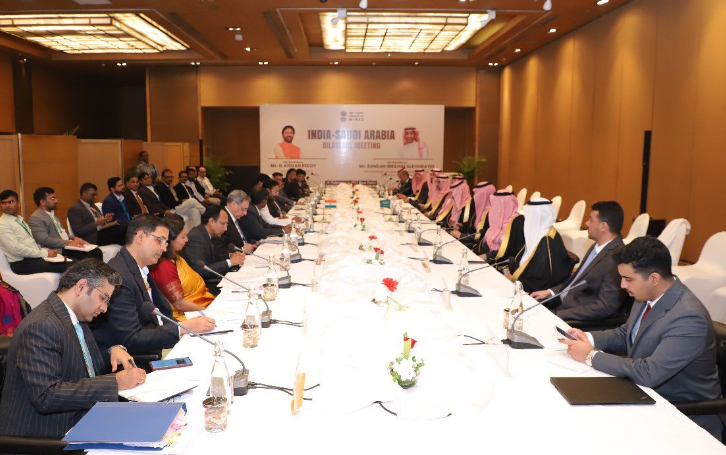Azzet’s Mission Critical is a weekly column that lays out the ebbs and flows around critical minerals supply chains - from production, refinement, mergers & acquisitions, to manufacturing and consumer products.
Already well-known for its vast oil reserves that have long fed into the world’s industrial economy, Saudi Arabia (KSA) is aiming to become a globally significant mining powerhouse, backed by a recently reported and upgraded US$2.5 trillion of estimated mineral resources.
The Saudi Kingdom is also aiming to become a global hub for strategic minerals processing, refining and trade - geared towards its Vision 2030 diversification and transformation plan.
It recently upgraded its estimated US$1.3 trillion worth of domestic mineral wealth to US$2.5 trillion - inclusive of significant deposits of gold, phosphate, bauxite, copper, rare earths and uranium.
Transformation
Announced in 2016, KSA’s Vision 2030, a bold and costly aim to harness its nascent domestic mineral wealth through sovereign and international mining investments. It also plans to use its strategic location between Asia, Europe and Africa to become a global hub throughout the metals supply chain.
Saudi mining minister H.E Kahild Al-Mudaifer says the endeavor is set out in a three-phase approach, as told by Semafor.
“To be an industrial [power], we need minerals. To build projects, we need minerals,” Al-Mudaifer said.
“Therefore, mining of Saudi Arabia [is] the first step, bringing minerals from outside is the second step, third step is to build Saudi Arabia as a hub.”
To accelerate the growth of its domestic mining industry, Riyadh started awarding mining exploration licenses to international investors three years ago, attracting foreign investment with its new Mining Investment Law which provides:
- Competitive Royalty Rates: A 5% royalty rate lower than many traditional mining jurisdictions
- Tax Stability Guarantee: A 20-year tax stability clause provides certainty for long-term investors
- Simplified Licensing: Streamlined permitting processes reducing approval times significantly
Branching out
To kick off 2025, KSA hosted its self-proclaimed ‘Davos of Mining’ event, hosting its Future Minerals Forum in Riyadh which brought in over 18,000 delegates involved in the mining sector, including 89 delegations of mining ministeries from across the globe last month.
Al-Mudaifer says when they started hosting the event the aim was to target regional businesses and governments, yet it has now grown to become a global minerals platform in just its first four years.
“We not only have the exploration and mining internationals, the financial sectors, the funders, but also the battery manufacturers, NGOs and national leaderships in closed meetings tackling the difficult issues the mining industry faces,” Al-Mudaifer said talking with Kitco at the event.
So far this year the Saudis have progressed a landmark trade deal with the UK to secure critical minerals supply chains between the two economic powerhouses.
It's also driving state investment into emerging markets where large swathes of untapped minerals remain undeveloped - especially below the equator in Africa and South America.
KSA says it will also deploy US$15bn into projects targeting copper, lithium, nickel and iron ore, with a focus on emerging economies like Namibia, Guinea and the Democratic Republic of Congo (DRC).
Multiple joint ventures have already been signed in the past few years, including 15 partnerships with China and a significant US$5 billion uranium exploration deal with Russia.
Money flow
Capital injections and project development by the country extend through its US$925 billion Public Investment Fund (PIF) - the world’s largest sovereign wealth fund - and its state-owned mining company Ma’aden.
“The Saudi Industrial Development Fund plays a crucial role, financing advanced exploration and mining projects. This includes covering up to 75% of eligible project costs,” Al-Mudaifer said.
“The fund also provides financing solutions for mid-tier and lower-end manufacturing, small and medium enterprises (SMEs), digitalisation efforts, renewable energy projects, and initiatives to increase local sector content.
“The investments will continue to position the Kingdom as a mining production and logistics hub for a region that stretches from Africa to Asia, while also supporting the transformation of our mining sector so it can achieve its potential.”
One such investment is Canadian mining major Barrick Gold's collaboration with Ma'aden to develop Saudi's Jabal Sayhid copper mine.
Ma’aden has also partnered with KSA state-owned multinational energy company Aramco to investigate lithium extraction capabilities.
Saudi’s namaskar moment
In a boon for the two Asian powers, Saudi Arabia and India agreed last Tuesday to strengthen cooperation in the critical minerals sector, as New Delhi seeks to accelerate its green energy transition.

India’s coal and mines minister G. Kishan Reddy and Saudi counterpart, Bandar Al-Khorayef, met in Delhi to discuss “fostering resilient supply chains, investments in mineral value addition, and technological collaboration,” India’s Ministry of Mines said in a statement.
“India and Saudi Arabia are deepening cooperation in the critical minerals sector.”
The meeting coincides with the subcontinent’s National Critical Mineral Mission, its plan aimed at securing the country’s energy and food security needs.



